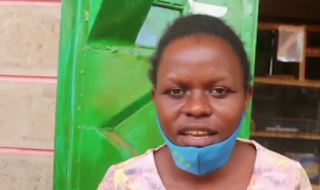THIS week, Nguuku location residents received the first mobile telephony connection since Kenya gained Independence in 1963.
Ms. Eunice Musyoki, an MPesa attendant speaks about the benefits of mobile phone connectivity in Nguuku, Mwingi North subcounty. Photo/COURTESY
This will open cyber opportunities for the Thagicu and Kyuso residents who had to walk for kilometres to make a simple phone call.
Some of the services they can enjoy are those provided by government through ecitizen portal. They will also be able to surf the internet using their phones and report incidences of insecurity in the area.
Locals thanked Kitui senator Enoch Kiio Wambua for pushing for realization of their technology dreams. “I am very happy for the network that was brought to us by our senator Kiio Wambua,” said Mr Noah Mwinzi, a local.
They will also be able to enjoy MPesa money transfer services which previously were unheard of in the location.
This is not the only region in Kitui County that was closed from the outside world until now. Most areas neighbouring Kora National Reserve in Tseikuru and Ngomeni lack the internet and residents have to stand at a particular area to access network. Others are forced to climb a tree to access a telecommunications signal.
The vast distances make business hard to do given it takes tens of kilometres to reach a serviced network area.
No network
All mobile telephone service providers like Telkom, Safaricom and Airtel are absent in the inner parts of Kyamututa and Mbundu.
Another burning issue that is never highlighted by local and national media houses is the unsustainable deforestation in the area neighbouring the game park.
Acres of land are shaved by inhabitants who sell charcoal to foreigners especially residents from as far as Central Kenya. The same trees are used to bake kilns where earthen bricks are made.
Although the bricks are of high quality, they take so many trees to bake and some get damaged during the construction process, making fundis to go back to the forests to cut more acacia and Miange trees. Other endangered species are misyathyu trees.
The residents survive by solar powered lamps and mobile devices. The area is unreached by national grid of Kenya Power and those that have endure regular power outages making them have the power cables but no power.
They are just having wooden posts but can’t post anything on social media since they are cut off from power. Yet, at the end of the month, just like every other customer, they are forced to cough standing charges by the power generating company.
The real issues for this region’s marginalization is not service by companies but reliability of those services.
Another factor that requires keen assessment is the value for money and cost of those services.
When citizens have many suppliers, forces of demand and supply make them choose the most suitable company and not relying on government monopoly and Safaricom’s near total monopoly of telcos.
For instance, Kenya Power doesn’t even bother highlighting that the region will be in blackout. Residents only wake up to dead phones, dark TVs and silent radios, making a day of shutdown of what is on a daily basis becoming essential services since it has been intertwined to normal routine.
Story by MUSYOKA NGUI











 MWINGI TIMES for timely and authoritative news.
MWINGI TIMES for timely and authoritative news.
No comments
Post a Comment